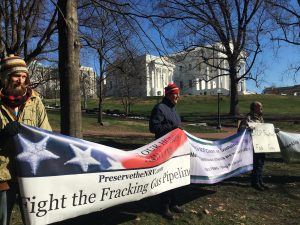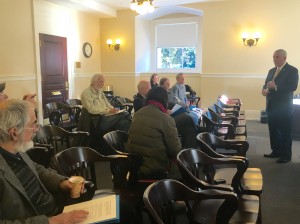
Virginians expressed their opposition to proposed natural gas pipelines in front of the Capitol Building in January.
Late last month, we learned that the U.S. Forest Service rejected the Atlantic Coast Pipeline’s proposed route. This development significantly checks the lickety-split pace of the project.
If that renews your desire to take action, there are opportunities channel that feeling into these important legislative fights in the General Assembly.
Lobby days in Richmond displayed pipeline opposition — now, committees coming up
As the chorus of Virginians voicing opposition to fracked gas pipelines in our region grows and becomes more diverse, we took our movement to the General Assembly for a major day of action to educate legislators about our agenda to safeguard land and water. On Tuesday, Jan. 19, participants from across Virginia came to Richmond and held dozens of meetings with state delegates and senators. Addressing attendees the morning of the event, State Senator John Edwards made it clear that he stands with Virginians who are concerned about the risks of the dirty pipeline proposals.
Citizen lobbyists covered issues including the landowners’ right to deny pipeline companies permission to enter their land to conduct invasive surveys (SB 614 and HB 1118) and the importance of requiring rigorous site-specific sediment and erosion control plans to protect streams and ensuring unrestricted public access to such plans (SB 726). Now these bills have been scheduled for upcoming committee meetings, so here are directions on informing your legislators:
SB 726 in Agriculture, Conservation and Natural Resources Committee on Feb. 4
SB 726 would fix a serious problem with how Virginia limits erosion and sediment pollution from utility company construction projects, including pipelines. The status quo system would allow the Atlantic Coast Pipeline and the Mountain Valley Pipeline to avoid proper regulation through a loophole. Area legislators in the relevant committee include senators Emmett Hanger and Mark Obenshain.
Tell your senator the current system is wrong — and here are some reasons why: it allows utility companies to avoid proper government agency oversight; it exempts utility companies from requirements that apply to all other construction projects; it excludes the public and local governments from involvement; and it greatly increases the threat of damage to the environment and property due to the extensive and complicated nature of these projects.
Urge your legislator to restore proper government oversight of these developments and revoke the free pass that companies now have to pollute Virginia waterways. Use the blue tab at the top of the General Assembly’s website to look up who represents you and find contact information for his or her office.
If you can make it, we encourage you to attend the committee at the General Assembly in Senate Room B on Thursday afternoon starting at or around 2 p.m. to impress the importance of these decisions upon our legislators in person.
Help Win Repeal of the “Survey Without Permission” Statute — Bills Up Soon in Commerce Committee
On Feb. 8 and 9, respectively, committees will take up SB 614 and HB 1118 related to companies’ ability to survey without landowner permission. You can contact your legislation in support of these measures by going to the General Assembly’s website and clicking the blue bar up top to find out who represents you and how to email or call their offices.
As background, HB 1118 and SB 614 are House and Senate versions of a bill to repeal VA 56-49.01, which allows Dominion to force surveys on unwilling property owners. That means that under Virginia law there is really no legal way for property owners to unequivocally demonstrate opposition to a gas pipelines, no matter the size, going through their property.
Be sure to contact your legislators before committees deal with these bills so that your comments will be most effective: the Senate Commerce and Labor Committee will discuss SB 614 Monday, Feb. 8, starting at approximately 2 p.m. The House Subcommittee on Energy will discuss HB 1118 on Tuesday, Feb. 9, starting at approximately 4 p.m. Again, feel free to attend, and contact hannah [at] appvoices [dot] org if you have questions about how to participate in these committees’ decisions.
What else does recent news tell us about these risky pipelines?
The U.S. Forest Service (USFS) letter to the Atlantic Coast Pipeline (that is, Dominion Resources) states that alternative routes cannot cut through “highly sensitive resources … of such irreplaceable character that minimization and compensation measures may not be adequate or appropriate and should be avoided.” The pipeline company has not, in the USFS’s view, demonstrated “why the project cannot reasonably be accommodated off National Forest Service (NFS) lands.”
If Dominion tries to stick with the original route, it will have to say why it thinks the pipeline has to be built on USFS lands. The company could propose a new route, impacting a different set of landowners and their properties, or it may have to go back to the drawing board with a new application. -We hope Dominion will turn in an entirely different direction, as this project, like the other pipelines proposed in Virginia, is unneeded, hazardous and misguided.
Communities in our region have been on the receiving end of the fracking boom. A major build-out of this kind of infrastructure will only worsen the impacts of fracking in those communities while locking us into decades of dependence on dirty energy. At the same time it defers our collective chance to harness the cleanest, most-sustainable energy sources — which happen to be a great deal for customers too.
Our work seems to be provoking a reaction. Dominion recently went into high-gear in its public relations. Spokesman Jim Norvelle said last week that gas-fired power plants are widely viewed as essential to meeting the goals of the Clean Power plan. To anyone who understands the economic opportunity presented by the EPA’s carbon pollution standards, or for those who have been reading recent reports describing the benefits of prioritizing renewable solar power, wind power and energy efficiency in Virginia, that probably sounds ludicrous. Whatever the polluters say or do next, and whenever there’s a chance to take action, we’ll be keeping you in the loop.
Stay informed by subscribing to the Front Porch Blog.




Leave a Reply